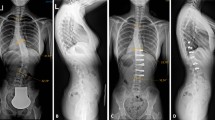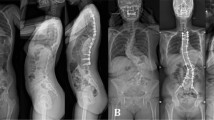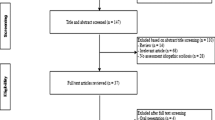Abstract
Introduction/purpose
In adult scoliosis surgery (AS) delineation of risk factors contributing to failure is important to improve patient care. Treatment goals include deformity correction resulting in a balanced spine and horizontal lowest instrumented vertebra (LIV) in fusions not ending at S1. Therefore, the study objectives were to determine predictors for deformity correction, complications, revision surgery, and outcomes as well as to determine predictors of postoperative evolution of the LIV-take-off angle (LIV-TO) and symptomatic adjacent segment disease (ASD).
Methods
The authors performed a retrospective analysis of 448 patients who had AS surgery. Patients’ age averaged 51 years, BMI 26, and follow-up of 40 months. According to the SRS adult scoliosis classification, 51 % of patients had major lumbar curves, 24 % each with single thoracic or double major curves. 54 % of patients had stable vertebra at L5 and 34 % of patients had fusion to S1. The mean number of posterior fusion levels was eight and implant density 73 %. Among standard radiographic measures of deformity the LIV-TO was assessed on neutral and bending/traction-films (bLIV-TO). Clinical outcomes were assessed in 145 patients with degenerative-type AS using validated measures (ODI, COMI and SF-36). Prediction analysis was conducted with stepwise multiple regression analyses.
Results
Preoperative thoracic curve (TC) was 53° and 33° at follow-up. Preoperative lumbar curve (LC) was 43° and 24° at follow-up. Curve flexibility was low (TC 34 %/LC 38 %). TC-correction (38 %) was predicted by preoperative TC (r = 0.9) and TC-flexibility (r = 0.8). LC-correction (50 %) was predicted by preoperative LC (r = 0.8), LC-flexibility (r = 0.8) and screw density (r = 0.7). Preoperative LIV-TO was 18.2° and at follow-up 9.4° (p < 0.01). 20 % of patients had a non-union (18 % at L5-S1). The risk for non-union at L5-S1 increased with age (p = 0.04), low screw density (p = 0.03), and postoperative sagittal imbalance [(T9-tilt (p = 0.01), C7-SVA (p = 0.01), LL (p = 0.01) and PI-LL mismatch (p = 0.01)]. 32 % of patients had revision surgery. Risk for revision was increased in fusions to S1 (p < 0.01), increased BMI (p < 0.01), sagittal imbalance (C7-SVA, p < 0.01), age (p = 0.02), and disc wedging distal to the LIV (p < 0.01). To a varying extent, clinical outcomes negatively correlated (p < 0.05) with revision, ASD, perioperative complications, age, low postoperative TC- and LC-correction, and sagittal and coronal imbalance at follow-up (C7-SVA, PT, and C7-CSVL). 59 patients had ASD, which correlated with preoperative and postoperative sagittal and coronal parameters of deformity. In a multivariate model, preoperative bLIV-TO (p < 0.01) and preoperative LIV-TO (p < 0.01) demonstrated the highest predictive strength for follow-up LIV-TO.
Conclusion
In the current study, the magnitude of deformity correction in the sagittal and coronal planes was shown to have significant impact on radiographic and clinical outcomes as well as revision rates. Findings indicate that risks for complications might be reduced by restoration of sagittal balance, appropriate deformity correction and advanced lumbosacral fixation. The use of preoperative LIV-TO and LIV-TO on bending/traction-films were shown to be useful for surgical planning, selection of the LIV and prediction of follow-up-TO, respectively. Parameters of sagittal balance rather than coronal deformity predicted ASD.



Similar content being viewed by others
References
Schwab F, Lafage V, Patel A, Farcy J-P (2009) Sagittal plane considerations and the pelvis. Spine 34:1828–1833
Yagi M, Akilah KB, Boachie-Adjei O (2010) Incidence, risk factors and classification of proximal junctional kyphosis: surgical outcomes review of adult idiopathic scoliosis. Spine 36:E60–E68
Blamoutier A, Guigui P, Charosky S, Roussouly P, Chopin D, Group d’Étude de la scoliose (2012) Surgery of lumbar and thoracolumbar scoliosis in adults over 50. Morbidity and survival in a multicenter retrospective cohort of 180 patients with a mean follow-up of 4.5 years. Orthop Traumatol Surg Res 98:528–535
Maruo K, Ha Y, Inoue S, Samuel S, Okada E, Hu SS, Deviren V, Burch S, William S, Ames CP, Mummaeni PV, Chou D, Berven SH (2013) Predictive factors for proximal junctional kyphosis in long fusions to the sacrum in adult spinal deformity. Spine 38:E1469–E1476
Kuklo TR, Lenke LG, Graham EJ, Won DS, Sweet FA, Blanke KM, Bridwell KH (2002) Correlation of radiographic, clinical, and patient assessment of shoulder balance following fusion versus nonfusion of the proximal thoracic curve in adolescent idiopathic scoliosis. Spine 27:2013–2020
O’Shaughnessy BA, Bridwell KH, Lenke LG, Cho W, Baldus C, Chang MS, Auerbach JD, Crawford CH (2012) Does a long fusion T3-sacrum portend a worse outcome than a short fusion T10-sacrum in primary surgery for adult scoliosis. Spine 37:884–890
Cho SKC, Briwdell KH, Lenke LG, Kang MM, Pahys J, Zebala LP, Yi J-S, Cho W, Baldus C (2010) Comparative analysis of clinical outcome and perioperative complications in primary vs. revision adult scoliosis surgery. In: 45th annual meeting of SRS, Kyoto/London
Kasten MD, Rao LA, Priest B (2010) Long-term results of iliact wing fixation below extensive fusions in ambulatory adult patients with spinal disorders. J Spinal Disord 23:E37–E42
Schairer WW, Carrer A, Deviren V, Hu SS, Takemoto S, Mummaneni P, Chou D, Ames C, Burch S, Tay B, Sawyer A, Berven SH (2013) Hospital readmission after spine fusion for adult spinal deformity. Spine 38:1681–1689
Scheer JK, Tang JA, Smith JS, Klineberg E, Hart RA, Mundis GM, Burton DC, Hostin R, O’Biren MF, Bess S, Kebaish K, Deviren V, Lafage V, Schwab F, Shaffrey CI, Ames CP, International Spine Study Group (2013) Reoperation rates and impact on outcome in a large, prospective multicenter, adult spinal deformity database. J Neurosurg Spine 19:464–470
Daubs MD, Lenke LG, Cheh G, Stobbs G, Bridwell KH (2007) Adult spinal deformity surgery. Spine 32:2238–2244
Howe CR, Agel J, Lee MJ, Bransford RJ, Wagnerr TA, Bellabarba C, Chapman JR (2011) The morbidity and mortality of fusions from the thoracic spine to the pelvis in the adult population. Spine 36:1397–1401
Kelly MP, Lenke LG, Bridwell KH, Agarwal R, Godzik J, Koester L (2013) Fate of the adult revision spinal deformity patient. Spine 38:E1196–E1200
Schwab FJ, Hawkinson N, Lafage V, Smith JS, Hart R, Mundis G, Burton DC, Line B, Akbarnia B, Boachie-Adjei O, Hostin R, Shaffrey CI, Arlet VA, Wood K, Gupta M, Bess S, Mummaneni PV, International Spine Study Group (2012) Risk factors for major peri-operative complications in adult spinal deformity surgery: a multi-center review of 953 consecutive patients. Eur Spine J 21:2603–2610
Glassmann SD, Hamill CL, Bridwell KH, Schwab FJ, Dimar JR, Lowe TG (2007) The impact of perioperative complications on clinical outcome in adult deformity surgery. Spine 32:2764–2770
Weistroffer JK, Perra JH, Lonstein JE, Schwender JD, Garvey TA, Transfeldt EE, Ogilvie JW, Denis F, Winter RB, Wroblewski JM (2008) Complications in long fusions to the sacrum for adult scoliosis: minimum five-year analysis of fifty patients. Spine 33:1478–1483
Charosky S, Guigui P, Blamoutier A, Roussouly P, Chopin D, Study Group on scoliosis (2012) Complications and risk factors of primary adult scoliosis surgery. Spine 37:693–700
Schwab F, e-Fegoun AB, Gamez L et al (2005) A lumbar classification of scoliosis in the adult patient: preliminary approach. Spine 30:1670–1673
Kim YJ, Bridwell KH, Lenke LG, Rhim S, Cheh G (2006) Pseudoarthrosis in long adult spinal deformity instrumentation and fusion to the sacrum: prevalence and risk factor analysis of 144 cases. Spine 31:2329–2336
Cho K-J, Suk S, Park S, Kim JH, Kang S-B, Kim H-S (2010) oh S-J. Risk factors of sagittal decompensation after long posterior instrumentation and fusion for degenerative lumbar scoliosis Spine 35:1595–1601
Kim YJ, Bridwell KH, Lenke LG, Rhim S, Cheh G (2006) An analysis of sagittal spinal alignment following long adult lumbar instrumented and fusion to L5 or S1: can we predict ideal lumbar lordosis ? Spine 31:2343–2352
Peelle MW, Boachie-Adjei O, Charles G, Kanazawa Y, Mesfin A (2008) The lumbar curve response to selective thoracic fusion in adult idiopathic scoliosis. Spine J 8:897–903
Sitte I, Kathrein A, Prof Pfaller K, Pedross F, Klosterhuber M, Lindtner R, Zenner J, Ferraris L, Meier O, Koller H (2013) Morphological differences in adult idiopathic scoliosis: a histological and ultrastructural investigation. Spine 38:1672–1680
Kasliwal MK, Shaffrey CI, Lenke LG, Dettori JR, Ely CG, Smith JS (2012) Frequency, risk factors, and treatment of distla adjacent segment pathology after long thoracolumbarr fusion. Spine 37:S165–S179
Lowe T, Berven SH, Schwab FJ, Bridwell KH (2006) The SRS classification for adult spinal deformity. Spine 31(Suppl):S119–S125
Schwab F, Farcy J-P, Bridwell K, Berven S, Glassmann S, Harrast J, Horton W (2006) A clinical impact classification of scoliosis in the adult. Spine 31:2109–2114
Storheim K, Brox JI, Løchting I, Werner EL, Grotle M (2012) Cross-cultural adaptation and validation of the Norwegian version of the core outcome measures index for low back pain. Eur Spine J 21:2539–2549
Carrier CS, Bono CM, Lebl DR (2013) Evidence-based analysis of adjacent segment degeneration and disease after ACDF: a systematic review. Spine J 13:1370–1378
Sanchez-Mariscal F, Gomez-Rice A, Izquierdo E, Pizones J, Zuniga L, Alvarez-Gponzalez P (2012) Correlation of radiographic and functional measurements in patients who underwent primary scoliosis surgery in adult age. Spine 37:592–598
Good CR, Lenke LG, Bridwell KH, O’Leary PT, Pichelmann MA, Keeler KA, Baldus CR, Koester LA (2010) Can posterior-only surgery provide similar radiographic and clinical results as combined anterior (thoracotomy/thoracoabdominal)/posterior approaches for adult scoliosis? Spine 35:210–218
Kuhns CA, Bridwell KH, Lenke LG, Amor C, Lehman RA, Buchowski JM, Edwards C, Christine B (2007) Thoracolumbar deformity arthrodesis stopping at L5—fate of the L5-S1 disc, minimum 5-year follow-up. Spine 32:2771–2776
Kim YB, Lenke LG, Kim YJ, Kim Y-W, Bridwell KH, Stobbs G (2008) Surgical treatment of adult scoliosis. Spine 33:1125–1132
Kim HJ, Buchowski JM, Zebala LP, Dickson DD, Koester L, Bridwell KH (2013) RhBMP-2 is superior to iliac crest bone graft for long fusions to the sacrum in adult spinal deformity. Spine 38:1209–1215
Yagi M, Hosogane N, Okada E, Watanabe K, Machida M, Tezuka M, Matsumoto M, Asazuma T, Keio Spine Research Group (2014) Factors influencing the postoperative progression of thoracic kyphosis in surgically treated adult patients with lumbar degeenrative scoliosis. Spine 39:E521–528
Harding IJ, Charosky S, Vialle R, Chopin DH (2008) Lumbar disc degeneration below a long arthrodesis (performed for scoliosis in adults) to L4 or L5). Eur spine J 17:250–254
Sansur CA, Smith JS, Coe JD, Glassman SD, Berven SH, Polly DW, Perra JH, Boachie-Adjei O, Shaffrey CI (2011) Scoliosis research society morbidity and mortality of adult scoliosis surgery. Spine 36:E593–E597
Pateder DB, Kebaish KM, Cascio BM, Neubaeur P, Matusz DM, Kostuik JP (2007) Posterior only versus combined anterior and posterior approaches to lumbar scoliosis in adults—a radiographic analysis. Spine 32:1551–1554
Finger T, Bayerl S, Onken J, Czabanka M, Woitzik J, Vajkoczy P (2014) Sacropelvic fixation versus fusion to the sacrum for spondylodesis in multilevel degenerative spine disease. Eur Spine J 23:1013–1020
Koller H, Zenner J, Hempfing A, Ferraris L, Meier O (2013) Reinforcement of lumbosacral instrumentation using S1-pedicle screws combined with S2-alar screws. Oper Orthop Traumatol 25:294–314
Pateder DB, Park Y-S, Kebaish KM, Cascio BM, Buchowski JM, Song EW, Shapiro MB, Kostuik JP (2006) Spinal fusion after revision surgery for pseudoarthrosis in adult scoliosis. Spine 31:E314–E319
Kim YJ, Bridwell KH, Lenke LG, Rhim S, Kim Y-W (2007) is the T9, T11, or L1 the more reliable proximal level after adult lumbar or lumbosacral instrumented fusion to L5 or S1. Spine 32:2653–2661
Tsuchiya K, Bridwell KH, Kuklo TR, Lenke LG, Baldus C (2006) Minimum 5-years analysis of L5-S1 fusion using sacropelvic fixation (bilateral and iliac screws) for spinal deformity. Spine 31:303–308
Maeda T, Buchowski JM, Kim YJ, Mishiro T, Bridwell KH (2009) Long adult spinal deformity fusion to the sacrum using rhBMP-2 versus autogenous iliac crest bone graft. Spine 34:2205–2212
Edwards CC, Bridwell KH, Patel A, Rinella AS, Kim YJ, Berra A, Rocca GJD, Lenke LG (2003) Thoracolumbar deformity arthrodesis to L5 in adults: the fate of the L5-S1 disc. Spine 28:2122–2131
Brown KM, Ludwig SC, Gelb DE (2004) Radiographic predictors of outcome after long fusion to L5 in adult scoliosis. J Spinal Disord 17:358–366
Kim YJ, Bridwell KH, Lenke LG, Glattes CR, Rhim S, Cheh G (2008) Proximal junctional kyphosis in adult spinal deformity after segmental posterior spinal instrumentation and fusion. Spine 33:2179–2184
Kim HJ, Bridwell KH, Lenke LG, Park MS, Song KS, Piyaskulkaew Chuntarapas T (2014) Patients with proximal junctional kyphosis requiring revision surgery have higher postoperative lumbar lordosis and large sagittal balance corrections. Spine 39:E576–E580
Le Huec JC, Aunoble S, Philippe L, Nicolas P (2011) Pelvic parameters: origin and significance. Eur Spine J 20:S564–S571
Vialle R, Levassor N, Rillardon L, Templier A, Skalli W, Guigui P (2005) Radiographic analysis of the sagittal alignment and balance of the spine in asymptomatic subjects. J Bone Joint Surg 87A:260–267
Schwab F, Dubey A, Gamez L, El Fegoun AB, Hwang K, Pagala M, Farcy JP (2002) Adult scoliosis: a quantitative radiographic and clinical analysis. Spine 27:387–392
Blondel B, Schwab F, Bess S, Ames C, Mummaeni PV, Hart R, Smith JS, Shaffrey CI, Burton D, Boachie-Adjei O, Lafage V (2013) Posterior global malalignment after osteotomy for sagittal plane deformity—it happens and here is why. Spine 38:E394–401
Mac-Thiong J-M, Tranfeldt EE, Mehbod AA, Perra JH, Denis F, Garvey TA, Lonstein JE, Wu C, Dorman CW, Winter RB (2009) Can C7 plumbline and gravity line predict health related qualty of life in adult scoliosis. Spine 34:E519–E527
Lafage V, Schwab F, Patel A, Hawkinson N, Farcy J-P (2009) Pelvic tilt and truncal inclination. Two key parameters in the setting of adults with spinal deformity. Spine 34:E599–E606
Glassman SD, Bridwell K, Dimar JR, Horton W, Berven S, Schwab F (2005) The impact of positive sagittal balance in adult spinal deformity. Spine 30:2024–2029
Glassman SD, Berven S, Bridwell KH, Horton W, Dimar JR (2005) Correlation of radiographic parameters and clinical symptoms in adult scoliosis. Spine 30:682–688
Smith JS, Klineberg E, Schwab F, Shaffrey CI, Moal B, Ames CP, Hostin R, Fu KMG, Burton D, Akbarnia B, Gupta M, Hart R, Bess S, Lafage V, International Spine Study Group (2013) Change in classification grade by the SRS-Schwab adult spinal deformity classification predicts impact on health-related quality of life measures. Spine 38:1663–1671
Daubs MD, Lenke LG, Bridwell KH, Kim YJ, Hung M, Cheh G, Koester LA (2013) Does correction of preoperative coronal imbalance make a difference in outcomes of adult patients with deformity. Spine 38:476–483
Acaroglu E, Guler UO, Yavu Y, Pellise F, Domingo-S M, Yakici S, Genc Y, Alanay A, Perez-Grueso FJS, European Spine Study Group (2013) Multiple regressio nanalysis of factors affecting HRQL in adult spinal deformity. In: 20th IMAST, Vancouver, Canada
Ploumis A, Liu H, Mehbod AA, Transfeldt EE, Winter RB (2009) A correlation of radiographic and functional measurements in adult degenerative scoliosis. Spine 34:1581–1584
Smith JS, Shaffrey CI, Glassmann SD, Carreon LY, Schwab FJ, Lafage V, Arlet V, Fu K-MG, Bridwell KH, The Spinal Deformity Study Group (2012) Clinical and radiographic parameters that distinguish between the best and worst outcomes of scoliosis surgery for adults. Eur Spine J 22:402–410
Acknowledgments
The study was supported by a Stryker International research grant.
Conflict of interest
None.
Author information
Authors and Affiliations
Corresponding author
Additional information
The first authors H.Koller and C.Pfanz contributed equally to the manuscript.
Electronic supplementary material
Below is the link to the electronic supplementary material.
Rights and permissions
About this article
Cite this article
Koller, H., Pfanz, C., Meier, O. et al. Factors influencing radiographic and clinical outcomes in adult scoliosis surgery: a study of 448 European patients. Eur Spine J 25, 532–548 (2016). https://doi.org/10.1007/s00586-015-3898-x
Received:
Revised:
Accepted:
Published:
Issue Date:
DOI: https://doi.org/10.1007/s00586-015-3898-x




